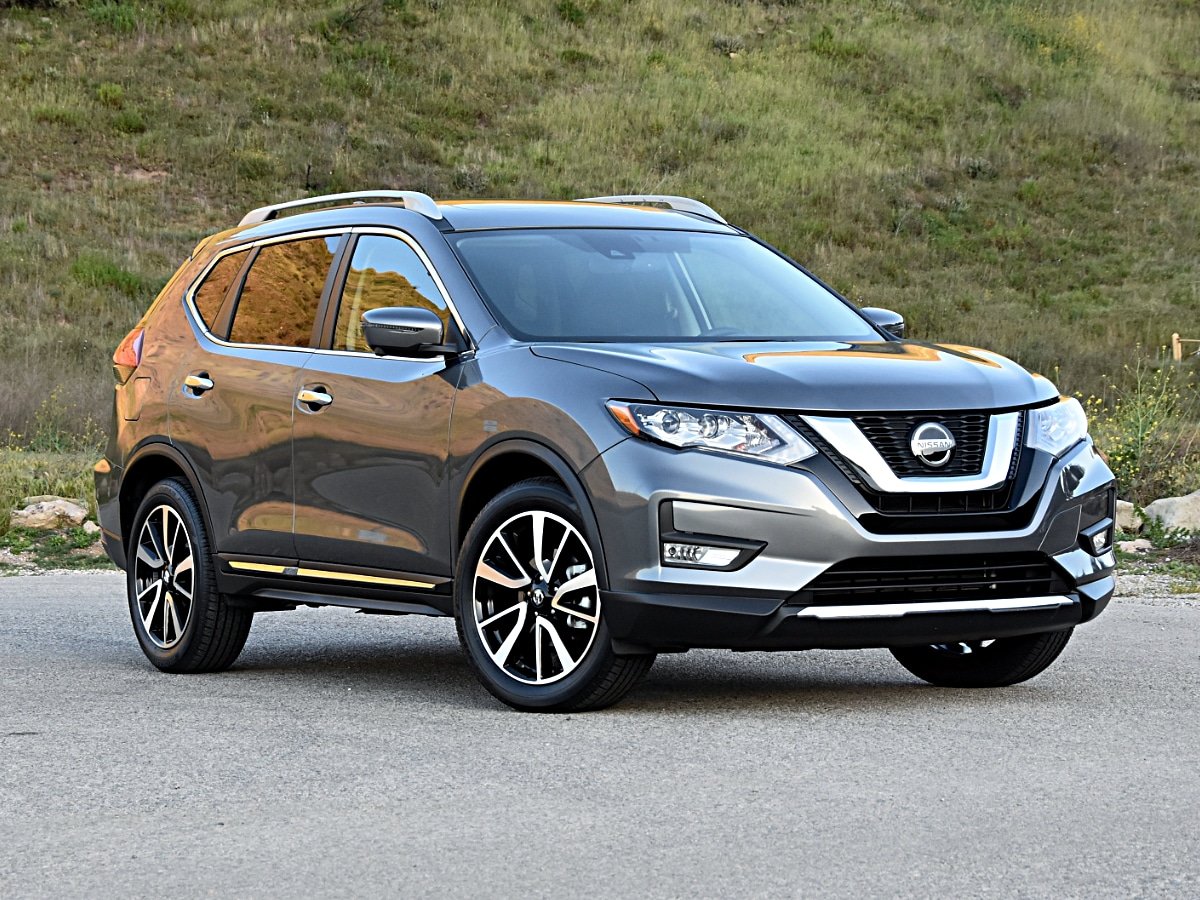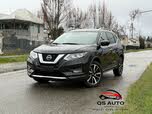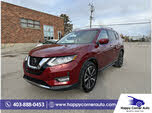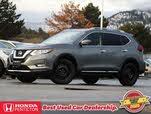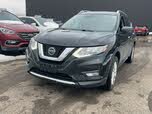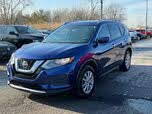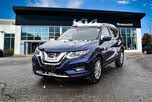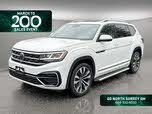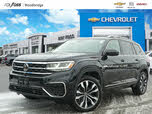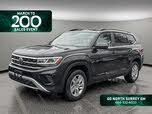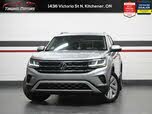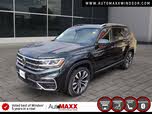2020 Nissan Rogue vs 2021 Volkswagen Atlas
Overview | ||
MSRP | $25,490 | $31,545 |
Average price | $21,409 | $33,838 |
Listings | ||
Ratings & Reviews | ||
User reviews | ||
Expert reviews | 6.0 out of 10Read full review | 6.5 out of 10Read full review |
Pros & cons | Pros
| |
Summary | By 2020 the Nissan Rogue was looking somewhat dated, having been on sale since 2014. Is it still worth considering, or are you better off looking at the newer model instead? The answers to these questions depend on who you are and what you value in a compact crossover SUV. | Introduced for the 2018 model year, the Volkswagen Atlas is the automaker's latest attempt to win over North American buyers. Built in Chattanooga, Tennessee, the VW Atlas competes in the three-row crossover SUV segment against well-established nameplates like the Ford Explorer, Honda Pilot, and Toyota Highlander. Changes for 2021 are limited to exterior styling tweaks and a reshuffled option list. VW also offers the two-row Volkswagen Atlas Cross Sport. |
Video | No video found | |
Popular Features & Specs | ||
Engine | 2.5L 170 hp I4 | 2.0L 235 hp I4 |
Drive Train | FWD | FWD |
Seating Capacity | 5 | 7 |
Horsepower | 170 hp @ 6000 rpm | |
MPG City | 26 | 21 |
MPG Highway | 33 | 24 |
Engine | ||
Engine Name | 2.5L 170 hp I4 | 2.0L 235 hp I4 |
Torque | 175 lb-ft @ 4400 rpm | |
Horsepower | 170 hp @ 6000 rpm | |
Drivetrain | FWD | FWD |
Fuel Economy | ||
MPG City | 26 | 21 |
MPG Highway | 33 | 24 |
Interior | ||
Seating Capacity | 5 | 7 |
Safety | ||
Front Crash Overall | 4 | 4 |
Side Crash Overall | 5 | 5 |
Dimensions & Capacity | ||
Cargo Space | 39.3 cu ft | 20.6 cu ft |
Curb Weight | 3463 lbs | 4248 lbs |
Height | 66.3 in | 70.1 in |
Length | 184.5 in | 200.7 in |
Width | 72.4 in | 78.4 in |
Wheelbase | 106.5 in | 117.3 in |
Maximum Payload | 1127 lbs | 1080 lbs |
Number of doors | 4 | 4 |
Maximum Towing Capacity | 2000 lbs | |
The 2020 Nissan Rogue, available in S, SV, and SL Platinum trims, offered a straightforward design with a single engine and transmission choice, and options for front-wheel or all-wheel drive. The SL Platinum trim, priced at an estimated $37,998 CAD, featured a bold V-Motion grille and 19-inch aluminum alloy wheels, giving it an attractive appearance despite its age. However, the interior design showed its age with older styling themes and unimpressive plastic surfaces. The padded centre console sides were a thoughtful touch for driver comfort.
In contrast, the 2021 Volkswagen Atlas received a styling refresh, including new bumpers, LED headlights and taillights, and a new grille, adding 6 centimetres to its length. The Atlas had a more extroverted look compared to its predecessor, with an R-Line trim package offering sportier aesthetics. Despite the cosmetic changes, the Atlas retained its MQB platform, shared with other VW models. The interior followed a minimalist approach, with a focus on functionality over decorative elements. The Atlas offered a standard seven-seat configuration, with options for second-row captain’s chairs on higher trims, and a range of wheel sizes from 18 to 21 inches.
The 2020 Nissan Rogue was equipped with a 2.5-litre four-cylinder engine producing 170 horsepower and 175 lb-ft of torque, paired with a continuously variable transmission (CVT). Weighing 1,664 kilograms, the Rogue's powertrain was adequate but not sporty, with a Sport driving mode that failed to enhance performance. The CVT managed power well, but the Rogue struggled with acceleration and responsiveness, particularly during highway merging or passing. Fuel efficiency was disappointing, with real-world consumption at 9.4 L/100 km, higher than the expected 8.2 L/100 km. The Rogue's ride and handling benefited from Intelligent Trace Control and Active Ride Control, but the driving experience was marred by heavy steering and CVT drone.
The 2021 Volkswagen Atlas offered two engine options: a 2.0-litre turbocharged inline-four with 235 horsepower and 258 lb-ft of torque, and a 3.6-litre VR6 with 276 horsepower and 266 lb-ft of torque. Both engines were paired with an eight-speed automatic transmission and standard 4Motion all-wheel drive. The base engine provided adequate acceleration, but the driving experience was underwhelming, with rough shifts and truck-like handling. The Atlas's ride quality was poor, with noticeable impacts from road imperfections. The AWD system included various drive modes, but none improved on-road handling. The VR6 model offered a towing capacity of 2,267 kilograms, while the four-cylinder model was limited to 900 kilograms. Fuel efficiency was unimpressive, with the four-cylinder rated at 10.9 L/100 km combined and the VR6 at 12.9 L/100 km.
The 2020 Nissan Rogue's interior comfort was compromised for taller drivers, with limited seat height adjustment and legroom. The rear seats, however, offered excellent thigh support, legroom, and visibility, enhanced by a panoramic moonroof. In-cabin storage was limited, but the cargo area provided 1,112 litres of space, with underfloor compartments and a Divide-n-Hide system for organization.
The 2021 Volkswagen Atlas, designed as a family hauler, offered average passenger and cargo space, with 2,741 litres behind the front seats and 583 litres with all seats up. The third-row legroom was generous, but second-row legroom was lacking. The second-row bench was uncomfortable, with thin cushions. The Atlas featured a logical layout of controls, with up to five USB ports and a wireless charging pad. It offered 17 cupholders, though forward visibility was limited. Parking sensors and optional active park assist aided in manoeuvring.
The 2020 Nissan Rogue's infotainment system included Bluetooth, Apple CarPlay, Android Auto, and SiriusXM, with upgrades for navigation and a Bose audio system. NissanConnect Services offered remote access and safety features, but the interface was outdated, with a 7-inch touchscreen and slow response times.
The 2021 Volkswagen Atlas featured Bluetooth and smartphone compatibility, with a base 6.5-inch touchscreen and an 8-inch screen on higher trims. The Digital Cockpit was available, replacing analog gauges with a digital display. The Atlas was set to receive the MIBIII system, enhancing voice recognition and navigation. The base audio system was decent, with a 12-speaker Fender system available on higher trims.
The 2020 Nissan Rogue came with standard Safety Shield 360, including forward-collision warning, automatic emergency braking, and blind-spot monitoring. Optional features included ProPilot Assist and a surround-view camera. However, the Rogue's crash-test ratings were subpar, with a 4-star NHTSA rating and issues with IIHS headlight and passenger protection ratings.
The 2021 Volkswagen Atlas received "good" IIHS crash-test ratings, with mixed headlight ratings. The 2020 model's NHTSA rating was five stars overall. Standard safety features included automatic emergency braking and blind-spot monitoring, with adaptive cruise control and lane-keep assist available. The Atlas was set to receive Travel Assist and Emergency Assist later in the model year.
CarGurus highlights

According to CarGurus experts, the overall rating for the 2020 Nissan Rogue is 6.0 out of 10, while the 2021 Volkswagen Atlas scores 6.5 out of 10. Based on these ratings, the Volkswagen Atlas is the recommended choice, offering a more modern design, advanced safety features, and greater interior space, making it a better option for families seeking a versatile SUV.
Choose the 2020 Nissan Rogue if:
Shop Now- You prioritize a lower price point with a straightforward design.
- Rear passenger comfort and cargo space are important to you.
- You value standard safety features like Safety Shield 360.
Choose the 2021 Volkswagen Atlas if:
Shop Now- You need a spacious three-row SUV with generous third-row legroom.
- You prefer a more modern and extroverted exterior design.
- You want advanced safety features and future tech upgrades.

By: CarGurus + AI
At CarGurus, our team of experienced automotive writers remain at the heart of our content operation, conducting hands-on car tests and writing insightful guides that are backed by years of industry experience. To complement this, we are harnessing AI to make our content offering more diverse and more helpful to shoppers than ever. To achieve this, our AI systems are based exclusively on CarGurus content, ratings and data, so that what we produce is both unique to CarGurus, and uniquely helpful to car shoppers.
